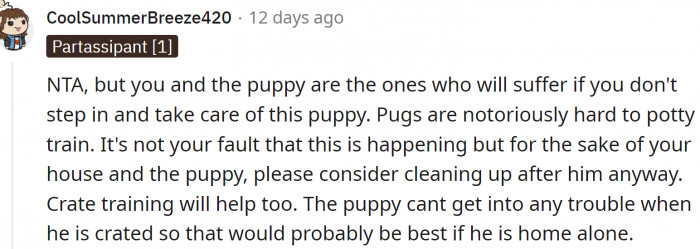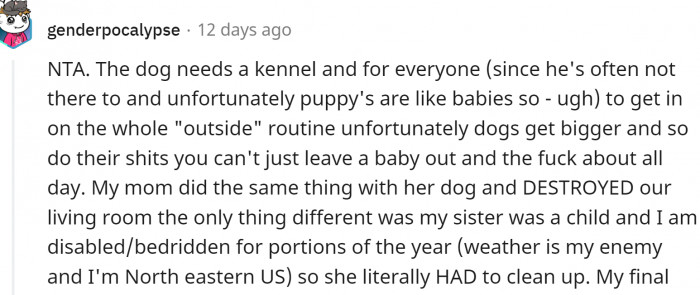Young Woman Refuses To Clean After A Dog Her Brother Brought Into Their Home Without Even Asking, Gets Called Out Because Of It
Dog ownership should not be taken lightly. Providing food and shelter is not enough. Dogs also need companionship, regular exercise, and… well, cleaning up after them. If you are not ready for it, don’t get a dog.
People can be very selfish beings. When we are feeling down and all alone in this world, pets are the first thing we reach for.
We take them into our homes so they can make us happier. It is like – “Dog, I brought you here, now make me happy.” And it doesn’t work that way.
They can't make you happy on command. Happiness comes from bonding.
Dogs don’t have an off button, and you can’t put them in a closet when you are done with your cheering-up session.
One Redditor has a similar problem. It is not her dog, but her brother's. However, she somehow ended up cleaning after it.
"My brother (22) came home from the military a couple of weeks ago. I don’t want to get into the details, but he has to go to multiple court hearings and is going through some financial problems. When he came home, he brought a small pug puppy named Rocky.
He never asked if it was okay or let us know in advance that he was bringing an animal over, but we let him stay. We told my brother that we would feed Rocky, but my brother needed to clean up after his messes, which he agreed to."
But even though he agreed to clean up after the dog, he seldom did. The final straw was when the dog ate some Vaseline and got diarrhea. OP's brother didn't clean it up for 24 hours.
OP has finally had enough. Her brother thinks she is overreacting. Read this interesting story and tell us what you think.
OP asks:

Her brother came home from the military, and he is going through some serious problems

He got a dog to help him emotionally, but he didn't even bother to ask if it was okay

Navigating Responsibilities in Shared Spaces
When a new pet enters a shared living space, it often brings about complex dynamics regarding responsibilities and expectations.
Research in social psychology suggests that clear communication about household roles can significantly reduce tension and enhance cooperation.
Understanding each person's feelings and responsibilities can foster a more harmonious environment.
Navigating Unwanted Responsibilities
When unexpected responsibilities arise, such as caring for a dog brought into the home without consent, it can lead to feelings of frustration and resentment.
Research in social psychology indicates that when people feel their boundaries are violated, it can trigger defensive reactions.
Understanding these dynamics is essential for managing feelings and fostering healthier communication.
He doesn't clean up after the dog

OP suggested some solutions, but her brother didn't want to listen

Now OP asks if she is right in this situation

From a psychological perspective, the arrival of a new pet can evoke feelings of anxiety, particularly if one partner feels overwhelmed by additional responsibilities.
Studies show that these feelings can lead to conflict if not addressed openly, making it crucial for partners to discuss their concerns.
Recognizing these dynamics can help couples navigate their feelings more effectively.
A clinical psychologist notes that such situations often reflect deeper issues around autonomy and respect within relationships.
Studies show that when individuals feel their choices are disregarded, it can lead to conflicts and emotional distress.
Recognizing these feelings is a critical first step in addressing the underlying issues.
Redditors agree:

They should rehome the dog

OP started cleaning after the dog, and now her brother counts on her to continue

Effective Communication Strategies
Effective communication is essential when navigating new responsibilities involving pets.
Research emphasizes the value of using 'I' statements to express feelings without escalating conflicts.
For instance, saying 'I feel stressed about the new puppy' can help foster understanding rather than defensiveness.
The Importance of Communication
Effective communication is vital when navigating unexpected responsibilities involving pets.
Experts recommend discussing feelings openly to foster a sense of teamwork in managing pet care.
This approach can help alleviate anxiety and promote collaborative decision-making.
OP and the puppy will suffer in this situation. It is clear that her brother doesn't really care that much

Dogs need training

Or else....

Additionally, establishing a shared understanding of pet care responsibilities can prevent misunderstandings and promote teamwork.
Creating a schedule for pet care tasks can ensure both partners feel equally involved and valued in their roles.
This collaborative approach fosters a sense of partnership in managing responsibilities.
According to research published in the Journal of Personality and Social Psychology, discussing feelings about responsibilities can help mitigate feelings of guilt and anxiety.
Creating a plan for how to manage pet care can provide clarity and reduce stress, allowing everyone involved to feel more comfortable.
Such proactive measures can significantly enhance the overall experience of shared pet ownership.
OP says that she likes Rocky and that she is not mad at him. “I am not mad at Rocky in this situation, as I understand that he’s a puppy and doesn’t know any better. I’m pissed at G for not taking responsibility and leaving his droppings on the floor. I do feel like the a-hole because I could clean up his mess, but it’s not my responsibility.”
And she is right. The dog is not her responsibility.
She should stand her ground.
Building a Supportive Environment
Creating a supportive environment around pet ownership is essential for managing unexpected challenges.
Research suggests that having a network of friends or family who understand the emotional challenges of pet care can provide reassurance and guidance.
Encouraging open conversations about responsibilities can foster a supportive atmosphere.
Behavioral studies indicate that emotional transparency can enhance relationship satisfaction.
When partners feel comfortable expressing their concerns about unexpected responsibilities, it can lead to more collaborative problem-solving.
Such dynamics can strengthen the bond between partners and provide a sense of shared responsibility.
Empathy in Pet Care Decisions
Empathy is essential when navigating unexpected responsibilities involving pets.
Research shows that understanding each other's emotional experiences can lead to more compassionate decision-making.
Encouraging empathetic dialogues can help transform potentially divisive topics into opportunities for connection and understanding.
Ultimately, recognizing the emotional dynamics of pet care can help owners navigate the complexities of decision-making.
By addressing feelings openly and creating supportive networks, pet owners can make informed choices that honor both their needs and the pet's well-being.
This approach not only benefits the pets but also enhances the overall satisfaction of the owners.
Psychological Analysis
This situation highlights the emotional challenges associated with unexpected responsibilities in pet ownership.
Open communication and empathy are essential for navigating these complexities effectively, ensuring a supportive environment for both pets and owners.
Analysis generated by AI
Analysis & Alternative Approaches
In navigating the complexities of unexpected responsibilities in pet ownership, effective communication and empathy are crucial.
By fostering open discussions and creating networks of support, pet owners can make informed decisions that prioritize both their emotional well-being and that of their pets.
Ultimately, prioritizing understanding and collaboration will enhance relationships and lead to healthier outcomes.
The Emotional Impact of New Pets
The introduction of a new pet can evoke a wide range of emotions, including excitement and stress.
Research in animal behavior indicates that while pets can enhance emotional well-being, they also require significant adjustments in daily routines, which can lead to feelings of overwhelm.
Understanding these emotional dynamics can help couples navigate this transition more effectively.
Analysis & Alternative Approaches
In conclusion, navigating the responsibilities that come with a new pet requires clear communication and understanding between partners.
By discussing feelings openly and establishing shared responsibilities, couples can create a more harmonious living environment.
Ultimately, addressing these dynamics collaboratively can enhance both the experience of pet ownership and the relationship itself.



